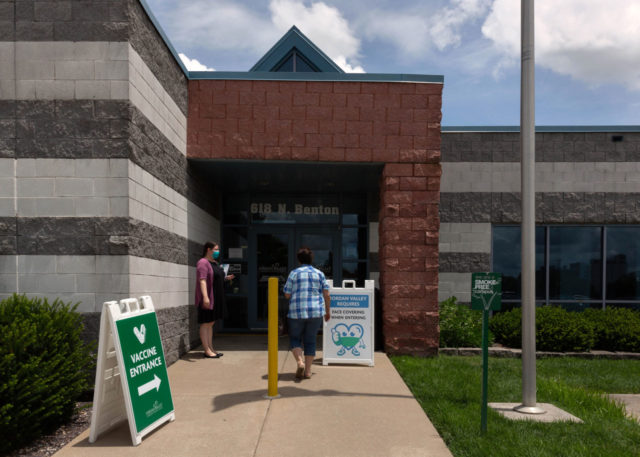
(CNN) — With Covid-19 cases rising in all 50 states, health officials say it’s clear that unvaccinated people are both driving the increase in cases and are most at risk.
“This is becoming a pandemic of the unvaccinated,” US Centers for Disease Control and Prevention Dr. Rochelle Walensky said during Friday’s White House Covid-19 briefing.
“We are seeing outbreaks of cases in parts of the country that have low vaccination coverage because unvaccinated people are at risk,” Walensky said. Meantime, “communities that are fully vaccinated are generally faring well.”
Cases are rising in every state and Washington, DC, with the average of new cases at least 10% higher than a week ago — and 38 states are seeing at least a 50% increase, according to a CNN analysis of data from Johns Hopkins University. Many experts have attributed the rise to slowing vaccination rates with only 48.3% of the US population fully vaccinated, per CDC data.
“Our biggest concern is that we are going to continue to see preventable cases, hospitalizations and, sadly, deaths among the unvaccinated,” Walensky said.
The danger is fueled by the growing prevalence of the Delta variant, first identified in India. Pointing to an “extraordinary surge” of the variant worldwide, Dr. Anthony Fauci said the Delta variant now has more than 50% dominance in the US. In some areas, it’s greater than 70%, he said, calling this “sobering news.”
In Arkansas, where only 35.1% of the population is fully vaccinated, the Delta variant has had a big impact, Chancellor of the University of Arkansas for Medical Sciences Cam Patterson said, adding hospitals are “full right now and cases are doubling every 10 days.”
And emergency response services in the state say there are receiving a record number of calls due to the rise in the virus, according to CNN affiliate KATV.
In Missouri, one local health department has asked the state to fund staffing and a location for a Covid-19 care site to handle to rise in severe cases, according to a statement from the Springfield-Greene County Health Department.
In California, Los Angeles County — the nation’s largest county with a population of 10 million people — has responded to a surge in cases and hospitalizations by reinstating a mask mandate beginning Saturday.
“The good news is that if you are fully vaccinated, you are protected against severe Covid, hospitalization and death,” Walensky said Friday, “and are even protected against the known variants, including the Delta variant.”
“If you are not vaccinated,” she added, “you remain at risk.”
Colleges and universities requiring vaccinations
Some businesses and hospitals have already required their employees to be vaccinated, and now some universities are implementing requirements as well.
Rhode Island has become the first state where all public and private colleges and universities require their students to be fully vaccinated before returning to campus this fall, Governor Dan McKee announced this week.
Dr. Nicole Alexander-Scott, Rhode Island’s director of health, said in the state’s news release that vaccinations are “key” to having a successful academic year.
“We cannot let our guard down now,” Alexander-Scott said. “The Delta variant is now circulating in parts of the country where many of our students live. The good news is that the vaccines provide protection against this variant. Anyone who has not been vaccinated should get vaccinated today.”
The University of California, the nation’s largest public university system, said it plans to mandate all students, faculty and staff be fully vaccinated before returning to campuses in the fall. Those who are not exempt from receiving the vaccine will be barred from in-person classes, activities and housing, UC officials announced Thursday.
An average of about 343,000 people are becoming vaccinated each day, a pace less than a quarter of the rate two months ago, when more than 1.3 million people were becoming vaccinated each day.
Experts like Dr. Fauci have said local vaccine mandates could be helpful in protecting the US from further surge. And such mandates for employees could become easier for private companies as the vaccine approval process move further along.
Each vaccine available in the US — by Pfizer/BioNTech, Moderna and Johnson & Johnson — has been authorized for emergency use. But the companies are still working toward full FDA approval.
“Getting full approval — getting out of the emergency use authorization and into full approval — is something that will clear up any legal questions that private employers may have,” former US Health and Human Services Secretary Kathleen Sebelius said Tuesday.
Employers, schools and universities should “get more serious” about telling people that choosing to not get vaccinated could mean losing access to places that could put others at risk.
“I think that it’s time to say to those folks, ‘It’s fine if you don’t choose to get vaccinated, (but) you may not come to work.'”
With so many people hesitating or resisting the vaccine and vaccination rates dropping, restrictions to work and school may be key to motivating the public to reach the necessary threshold to slow or stop the spread, experts have said.
Misinformation costing lives
Meanwhile, key reasons for the hesitancy around Covid-19 vaccines are mistrust and misinformation, according to a CNN analysis of data from the US Census Bureau’s Household Pulse Survey.
Nearly half of people who said they will “definitely” or “probably” not get a Covid-19 vaccine cited mistrust in the vaccines as a reason for not getting vaccinated, according to the latest data, published Wednesday and based on survey responses from June 23 to July 5. That’s an increase from about a month ago, when 46% of people who said they did not plan to be vaccinated gave the same reason.
“Millions of people don’t have access to accurate information right now, because on social media platforms and other tech platforms we’re seeing the rampant spread of misinformation, and it’s costing people their lives,” US Surgeon General Dr. Vivek Murthy told CNN’s Jake Tapper.
Much of that information frequently comes out of people with good intent, he added, saying that they think they are spreading helpful information, but that often misinformation spreads more quickly than accurate information.
US Health and Human Services Secretary Xavier Becerra agreed, telling CNN’s Poppy Harlow, “People are being told things that aren’t true, and they’re becoming more hesitant.”
“But fortunately, there are people who are seeing the facts,” he said. “They’re seeing a loved one, unfortunately, get hospitalized, maybe die. And they’re changing their minds.”
One of the best ways to combat the misinformation, Murthy said, is to have conversations with your friends and family.
“It’s about peers talking to peers,” Murthy said during a Stanford University panel event on Thursday. “Remember, all of these conversations first start with listening… so try to understand where somebody is coming from, why they may be worried. It may not always be what you think.”
The-CNN-Wire
™ & © 2021 Cable News Network, Inc., a WarnerMedia Company. All rights reserved.



























